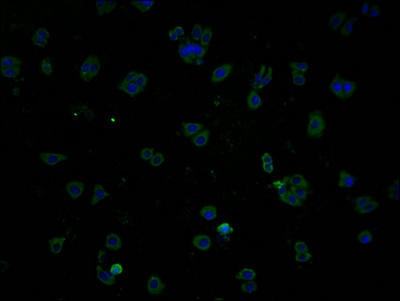Description
| Antibody Name: | PLPPR1 Antibody (PACO64471) |
| Antibody SKU: | PACO64471 |
| Size: | 50ul |
| Host Species: | Rabbit |
| Tested Applications: | ELISA, IF |
| Recommended Dilutions: | IF:1:100-1:500 |
| Species Reactivity: | Human |
| Immunogen: | Peptide sequence from Human Phospholipid phosphatase-related protein type 1 protein (51-66AA) |
| Form: | Liquid |
| Storage Buffer: | Preservative: 0.03% Proclin 300 Constituents: 50% Glycerol, 0.01M PBS, PH 7.4 |
| Purification Method: | >95%, Protein G purified |
| Clonality: | Polyclonal |
| Isotype: | IgG |
| Conjugate: | Non-conjugated |
 | Immunofluorescence staining of HepG2 cells with PACO64471 at 1:100, counter-stained with DAPI. The cells were fixed in 4% formaldehyde and blocked in 10% normal Goat Serum. The cells were then incubated with the antibody overnight at 4°C. The secondary antibody was Alexa Fluor 488-congugated AffiniPure Goat Anti-Rabbit IgG(H+L). |
| Background: | integral component of plasma membrane, nucleoplasm, lipid phosphatase activity, phosphatidate phosphatase activity, phospholipid dephosphorylation, phospholipid metabolic process, signal transduction |
| Synonyms: | Phospholipid phosphatase-related protein type 1 (Lipid phosphate phosphatase-related protein type 1) (Plasticity-related gene 3 protein) (PRG-3), PLPPR1, LPPR1 PRG3 |
| UniProt Protein Function: | PRG-3: a member of the plasticity-related gene (PRG) family. Members of the PRG family mediate lipid phosphate phosphatase activity in neurons and are known to be involved in neuronal plasticity. The protein encoded by this gene does not perform its function through enzymatic phospholipid degradation. This gene is strongly expressed in brain. It shows dynamic expression regulation during brain development and neuronal excitation. Alternatively spliced transcript variants encoding the same protein have been observed. [provided by RefSeq, Jul 2008]Protein type: Membrane protein, integral; Membrane protein, multi-passChromosomal Location of Human Ortholog: 9q31.1Cellular Component: integral to plasma membraneMolecular Function: lipid phosphatase activityBiological Process: nervous system development; phospholipid dephosphorylation; phospholipid metabolic process; signal transduction |
| UniProt Protein Details: | |
| NCBI Summary: | This gene encodes a member of the plasticity-related gene (PRG) family. Members of the PRG family mediate lipid phosphate phosphatase activity in neurons and are known to be involved in neuronal plasticity. The protein encoded by this gene does not perform its function through enzymatic phospholipid degradation. This gene is strongly expressed in brain. It shows dynamic expression regulation during brain development and neuronal excitation. Alternatively spliced transcript variants encoding the same protein have been observed. [provided by RefSeq, Jul 2008] |
| UniProt Code: | Q8TBJ4 |
| NCBI GenInfo Identifier: | 46877064 |
| NCBI Gene ID: | 54886 |
| NCBI Accession: | NP_060223.2 |
| UniProt Secondary Accession: | Q8TBJ4,Q5VX23, Q9NXE2 |
| UniProt Related Accession: | Q8TBJ4 |
| Molecular Weight: | 35,795 Da |
| NCBI Full Name: | phospholipid phosphatase-related protein type 1 |
| NCBI Synonym Full Names: | phospholipid phosphatase related 1 |
| NCBI Official Symbol: | PLPPR1 |
| NCBI Official Synonym Symbols: | LPPR1; PRG-3 |
| NCBI Protein Information: | phospholipid phosphatase-related protein type 1 |
| UniProt Protein Name: | Phospholipid phosphatase-related protein type 1 |
| UniProt Synonym Protein Names: | Lipid phosphate phosphatase-related protein type 1 |
| Protein Family: | |
| UniProt Gene Name: | PLPPR1 |
| UniProt Entry Name: | PLPR1_HUMAN |






